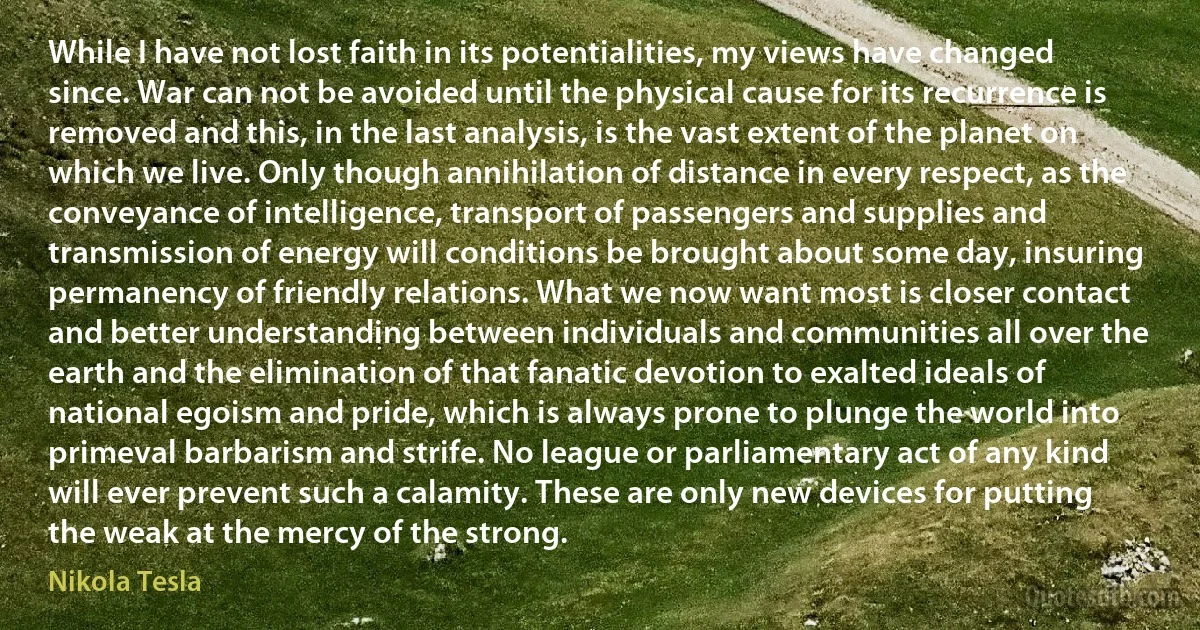
While I have not lost faith in its potentialities, my views have changed since. War can not be avoided until the physical cause for its recurrence is removed and this, in the last analysis, is the vast extent of the planet on which we live. Only though annihilation of distance in every respect, as the conveyance of intelligence, transport of passengers and supplies and transmission of energy will conditions be brought about some day, insuring permanency of friendly relations. What we now want most is closer contact and better understanding between individuals and communities all over the earth and the elimination of that fanatic devotion to exalted ideals of national egoism and pride, which is always prone to plunge the world into primeval barbarism and strife. No league or parliamentary act of any kind will ever prevent such a calamity. These are only new devices for putting the weak at the mercy of the strong.
Nikola TeslaRelated topics
act annihilation barbarism calamity cause closer conveyance day distance earth egoism elimination faith fanatic friendly intelligence kind last live lost mercy national now parliamentary permanency pride putting recurrence respect strife transmission understanding vast war while world relationsRelated quotes
The Filipino, it seems, has lost his soul, his dignity, and his courage. We have come upon a phase of our history when ideals are only a veneer for greed and power, (in public and private affairs) when devotion to duty and dedication to a public trust are to be weighted at all times against private advantages and personal gain, and when loyalties can be traded...Our government is in the iron grip of venality, its treasury is barren, its resources are wasted, its civil service is slothful and indifferent, its armed forces demoralized and its councils sterile. We are in crisis. You know that the government treasury is empty. Only by severe self-denial will there be hope for recovery within the next year...This nation can be great again. This I have said over and over. It is my articles of faith, and Divine Providence has willed that you and I can now translate this faith into deeds.

Ferdinand Marcos
When the great truth accidentally revealed and experimentally confirmed is fully recognized, that this planet, with all its appalling immensity, is to electric currents virtually no more than a small metal ball and that by this fact many possibilities, each baffling imagination and of incalculable consequence, are rendered absolutely sure of accomplishment; when the first plant is inaugurated and it is shown that a telegraphic message, almost as secret and non-interferable as a thought, can be transmitted to any terrestrial distance, the sound of the human voice, with all its intonations and inflections, faithfully and instantly reproduced at any other point of the globe, the energy of a waterfall made available for supplying light, heat or motive power, anywhere - on sea, or land, or high in the air - humanity will be like an ant heap stirred up with a stick: See the excitement coming!

Nikola Tesla
Microeconomics, including the study of individual choice and of group choice in market and nonmarket processes, has generally been considered a field science as distinct from an experimental science. Hence microeconomics has sometimes been classified as "non-experimental" and closer methodologically to meteorology and astronomy than to physics and experimental psychology (Marschak, 1950, p. 3; Samuelson, 1973, p. 7). But the question of using experimental or nonexperimental techniques is largely a matter of cost, and generally the cost of conducting the most ambitious and informative experiments in astronomy, meteorology, and economics varies from prohibitive down to considerable. The cost of experimenting with different solar system planetary arrangements, different atmospheric conditions, and different national unemployment rates, each under suitable controls, must be regarded as prohibitive.

Vernon L. Smith
Is the Gospel story historically true? Is it a mystical tale of great beauty and of real teaching value but nevertheless of no vital import to the intelligent men and women of today, who pride themselves on their reasoning powers and upon their independence of ancient mental trammels and of old and dusty traditions? As to the perfection of the portrayed character of Christ there is never any question. The enemies of Christianity admit His uniqueness, His basic profundity and His understanding of the hearts of men. They recognise the intelligence of His ideas and sponsor them in their own philosophies. The developments which the Carpenter of Nazareth brought about in the fabric of human life, His social and economic ideals, and the beauty of the civilisation which could be founded upon the ethical teaching of the Sermon on the Mount are frequently emphasised by many who refuse to recognise His mission as an expression of divinity.

Alice Bailey
To elevate every desire, however obscene, into a good because it is desired may be the way of all flesh, but it is not the way of the Cross. And the moral anarchy which is said to pervade our youth...is not going to be countered by lowering the demands of religion, but by insisting on them. The notion that to enlist the support and enthusiasm of youth it is necessary to condone their vices is entirely to misjudge them, and to forfeit their respect. The churches are much more likely to fail in the long run because they demand too little than because they demand too much of human nature. The real tragedy of the position in which the young find themselves to-day arises from the collapse of the orthodoxy of past generations, and the failure to replace it by a confident coherent faith applicable to the conditions of to-day. Principles may be eternal, but their embodiment must be temporal.

Stanley Baldwin
